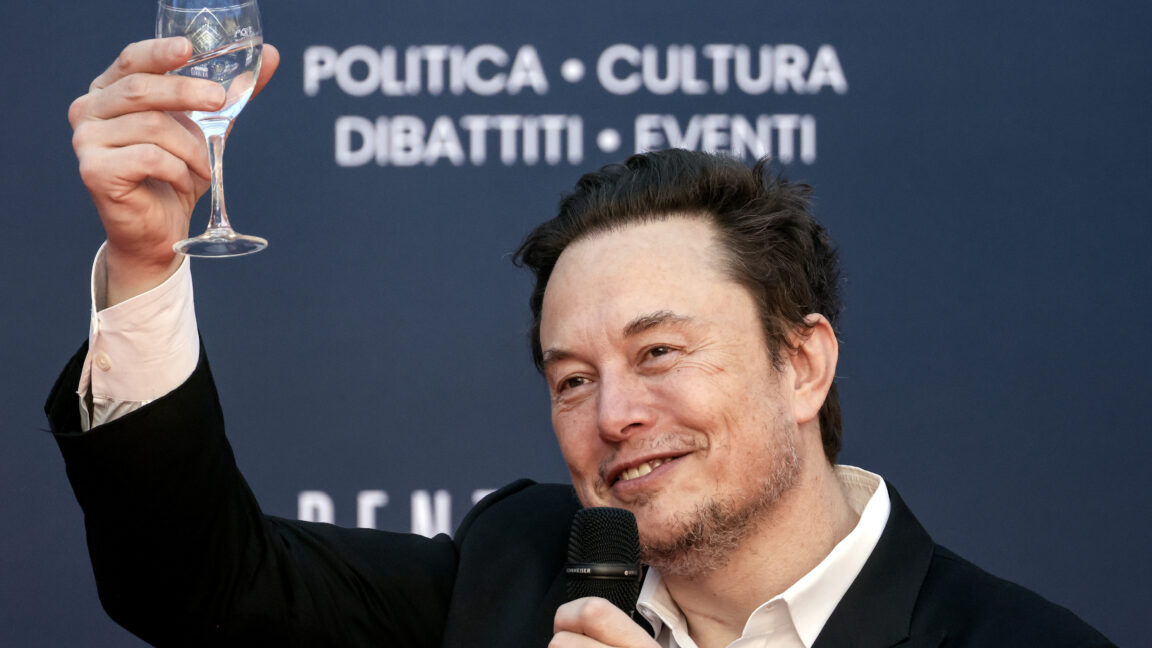“We are strong if we remain united and defend our infrastructure.”

Elon Musk raises a glass at the Atreju convention in Rome, Italy, on Saturday, Dec. 16, 2023. The annual event is organized by Giorgia Meloni’s Brothers of Italy party. Credit: Alessia Pierdomenico/Bloomberg via Getty Images
The Italian government is considering the purchase of satellite Internet services from SpaceX’s Starlink constellation, and the potential deal has triggered controversy along political, economic, and spaceflight lines in Europe.
The story was initially broken by Bloomberg on Sunday, which reported that Italy is in “advanced talks” with SpaceX to purchase $1.6 billion worth of secure telecommunication services from SpaceX. The publication said an agreement, for which talks began in mid-2023, had been stalled until Italian Prime Minister Giorgia Meloni visited President-elect Donald Trump in Florida recently.
This report set off a firestorm of responses that highlight the increasing sensitivity of European countries to partnering with SpaceX—the success of which has put serious pressure on Europe’s launch industry—as well as the Trump administration and SpaceX founder Elon Musk.
On Monday, the Italian government issued a statement that denied any contracts have been signed for Starlink satellite services, which include secure broadband Internet and other communications from thousands of satellites in low-Earth orbit. The government statement went further, “categorically” denying that SpaceX was discussed during Meloni’s meeting with Trump. However, the Italian government acknowledged that it was conducting talks with SpaceX.
Ars Video
What Happens to the Developers When AI Can Code? | Ars Frontiers
A threat to Iris²
Starlink already operates commercially in Italy. But the country’s possible acquisition of Starlink services for governmental purposes effectively tosses a grenade into a carefully negotiated plan to develop a sovereign constellation intended to provide secure communications for European nations and their militaries. This is the Infrastructure for Resilience, Interconnectivity and Security by Satellite, or IRIS² constellation, and the final agreement was announced less than a month ago.
Developed by the European Union and European Space Agency, with Italian participation, this constellation of 290 satellites is planned to come online by 2030 at a development cost of $10.5 billion. During the lengthy negotiations, Italy even managed to secure one of the three primary ground stations in the Abruzzo region of the country.
The response from some Italian and European officials to the potential agreement between Italy and SpaceX has been ferocious.
Antonio Misiani, former deputy finance minister for Italy and senator for the opposition Democratic Party, told Politico that a completed agreement would represent an “unacceptable sell-out of national sovereignty.”
An Atlantic Council senior fellow and former policy advisor to the Italian government, Beniamino Irdi, told the Financial Times, “It sends a political signal to the EU,” Irdi said. “Iris² is a symbol of Europe’s strategic autonomy, and a key EU member shifting to a different solution can be interpreted as a sign of divestment from that.”
There are multiple layers of frustration here beyond Iris². One concerns Musk, who, since the election of Trump, has turned his attention toward advancing far-right political causes in Europe, particularly in Germany and the United Kingdom. Meloni, a conservative leader of Italy, considers Musk a friend and ally. Andrea Stroppa, one of Musk’s advisers in Italy, explained in September that “Elon recognizes Giorgia Meloni’s leadership. And he sees in her the same thing he sees in Donald Trump, someone who can defend Western values in danger.”
Battling with Breton
Musk has also had a long-running feud with French businessman Thierry Breton, who was Commissioner for the Internal Market of the European Union for five years until last September. Breton spearheaded the Iris² initiative to provide secure communications from low-Earth orbit. He also championed the Digital Services Act, which aims to curb misinformation published online in Europe. The European Commission has been energetically investigating Musk’s social media site X under the law.
In an article published Wednesday in the Italian newspaper la Repubblica, Breton argued that Italy should not undermine Europe’s efforts for sovereignty in telecommunications. “As commissioner I fought to launch Iris²,” Breton said. “All EU countries supported the launch of Iris². Italy also participated and I think it did well because it is a very important element of our sovereignty. Europe is one of the world’s great democracies with 450 million inhabitants, more than the US. We are strong if we remain united and defend our infrastructure, our industry and our laws.”
The remarkable success of the Starlink constellation, demonstrated during the war in Ukraine and increasingly valuable as a tool for the US military, has spooked some international governments. A recent assessment of Chinese articles found that the consensus view in the Asian nation was that Starlink threatens China’s security interests. Doubtlessly, some US allies in Europe feel similarly.
It all must seem so frustrating for these European officials. They have watched as SpaceX has risen to dominate the global launch market, threatening European launch firms, including Italy-based Avio. They have seen Musk cozy up to the next US president with whom many Europeans are uncomfortable, and more recently bolster the far-right politicians in Europe who threaten the political balance of those nations. He has flouted their laws, which call for online information to be trustworthy. And now, Musk is plying his friendship with Italian leaders and pulling at the threads that bind the continent’s next big ambition in space, a version of the Starlink constellation.
Where, they must be thinking, will this end?






